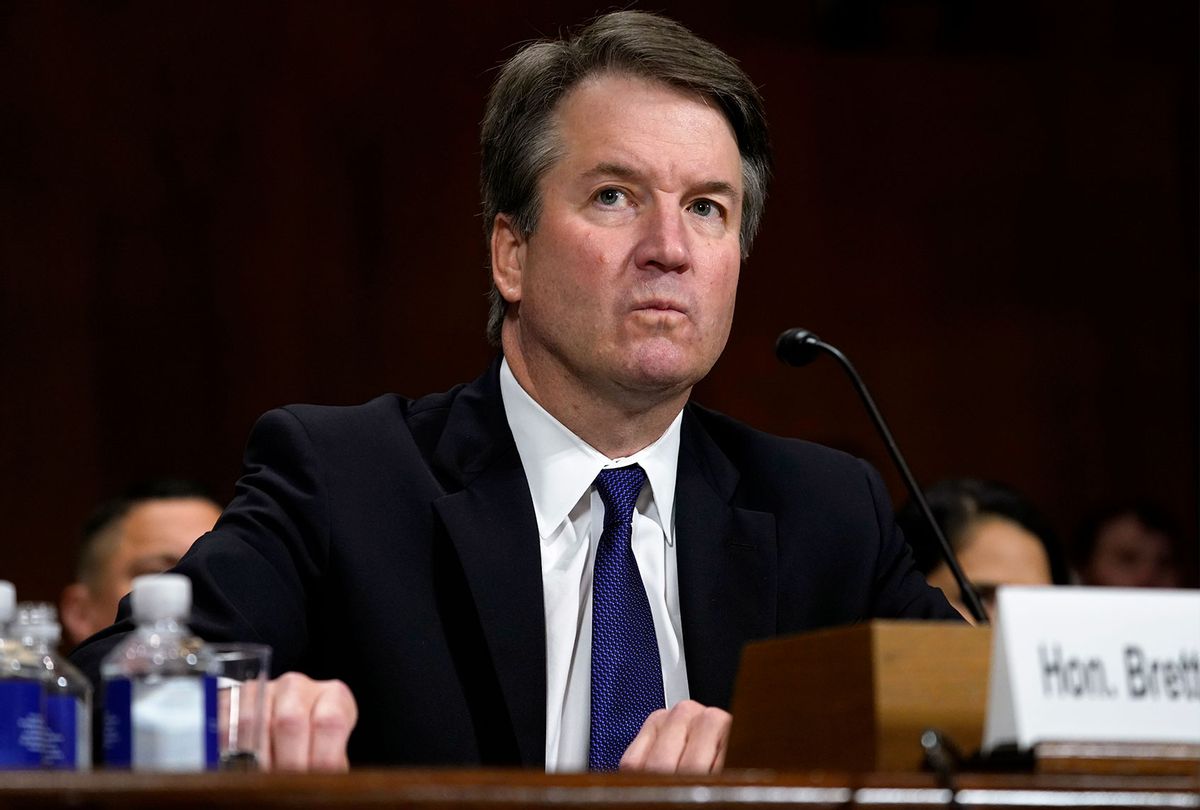Supreme Court Justice Brett Kavanaugh tested positive for COVID ahead of fellow Justice Amy Coney Barrett's formal swearing-in ceremony, the court said Friday.
Kavanaugh, who has been fully vaccinated since January, tested positive for COVID ahead of Barrett's investiture, the court said in a news release. He has no symptoms and his wife and daughters, who are also fully vaccinated, tested negative. But the family did not attend the Friday ceremony as a "precaution."
Barrett, who was confirmed on a straight party-line vote to replace the late Justice Ruth Bader Ginsburg just a week before the 2020 election — at the time, the Senate had a 52-48 Republican majority — had her formal swearing-in delayed by nearly a year as a result of the pandemic. More than two dozen people who attended former President Donald Trump's announcement of her nomination last fall later tested positive. Barrett herself reportedly tested positive for COVID last summer before her nomination.
All nine justices are scheduled to hold their first in-person session on Monday, but it's unclear if Kavanaugh will attend. Arguments will not be open to the public but the court will provide a live audio feed. The justices have been holding conference calls to hear arguments since last March.
Kavanaugh tested negative as recently as Monday ahead of a private meeting with his fellow justices. The Trump appointee participated in the ACLI Capital Challenge race with numerous members of Congress and other Washington officials on Wednesday.
Want a daily wrap-up of all the news and commentary Salon has to offer? Subscribe to our morning newsletter, Crash Course.
Though fully vaccinated people can still get COVID, those who have received the Pfizer or Moderna vaccine are 60-70% less likely to be infected. All three available vaccines are 86% effective in preventing hospitalization, according to a recent study published by the Centers for Disease Control and Prevention, and unvaccinated people are many times more likely to die from COVID than the vaccinated.
The court's upcoming term will feature two hotly-watched cases with major national implications.
Justices are scheduled to hear a challenge to a Mississippi law that bans most abortions after 15 weeks. Reproductive health advocates worry that the Trump-packed court may use the case to chip away at the 1973 Roe v. Wade precedent, or even overturn it entirely. Kavanaugh defenders like Sen. Susan Collins, R-Maine, insisted during his confirmation process that he views Roe as settled law but that is by no means clear. Kavanaugh joined Barrett and fellow Trump appointee Neil Gorsuch in allowing Texas' near-total abortion ban to go into effect last month, further stoking fears that the court may eventually rule there is no constitutional right to an abortion.
The court is also scheduled to hear a challenge to a New York law restricting guns in public in its first major Second Amendment case in more than a decade.
The court came under criticism over the summer even before its Texas abortion ruling after issuing "shadow docket" decisions blocking President Joe Biden from reversing an immigration policy that required many asylum seekers to remain in Mexico while their claims were processed and striking down the administration's federal eviction moratorium.
Justice Samuel Alito defended the court this week amid concerns over its growing politicization and its use of the shadow docket, in which it issues often unsigned important opinions without hearing arguments.
"The catchy and sinister term 'shadow docket' has been used to portray the court as having been captured by a dangerous cabal that resorts to sneaky and improper methods to get its ways," Alito complained during a speech at the University of Notre Dame Thursday. "And this portrayal feeds unprecedented efforts to intimidate the court or damage it as an independent institution."
Alito accused critics of seizing on the shadow docket issue to criticize opinions they don't like, but did not respond to the same criticism from liberal members of the court.
Justice Elena Kagan in the Texas abortion case penned a blistering dissent, which was joined by Justices Sonia Sotomayor and Stephen Breyer, blasting the conservative majority for failing to "explain its conclusion" that the law should stand.
"The majority's decision is emblematic of too much of this Court's shadow-docket decision-making — which every day becomes more unreasoned, inconsistent, and impossible to defend," Kagan wrote.
The court's approval plummeted amid its controversial decisions over the summer. A recent Marquette University Law School poll found that public approval of the court fell from 60% in July to 49% in September following the Texas decision. A separate survey from Gallup found the court's approval rating falling to just 40%, the lowest since tracking began.



Shares